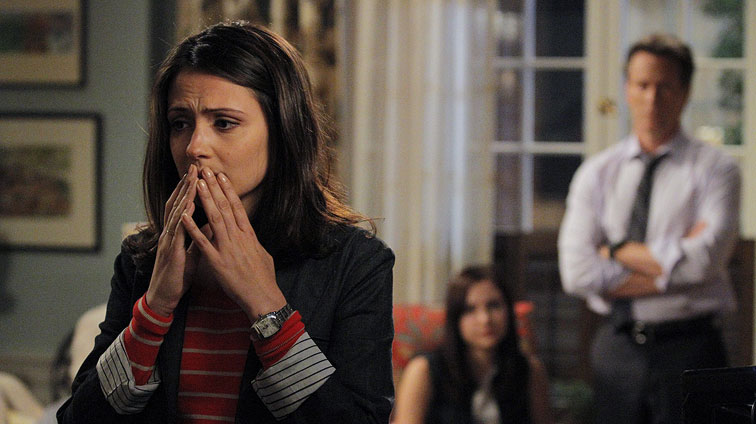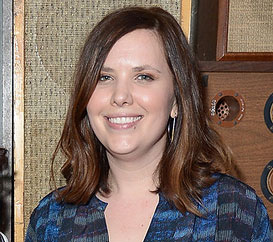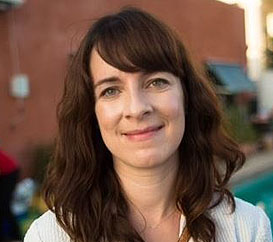
While You Were Making Other Plans
Does TV really need another show about cancer? Chasing Life’s Joni Lefkowitz and Susanna Fogel didn’t think so until they found a new perspective on the disease that they realized had yet to be explored.
 Joni Lefkowitz
Joni Lefkowitz
 Susana Fogel
Susana Fogel
When I was in college all I was thinking about was when I'm in my 30s this is what I'll have. If you're confronted with the possibility that those 30s might not ever be there, you might change the way you live your life
— Susanna FogelWhen Joni Lefkowitz and Susanna Fogel caught wind that ABC Family was developing an American version of the Mexican series Terminales, about a young overachiever whose worldview is derailed by a leukemia diagnosis, their initial reaction was to roll their eyes. “We were like, ‘There does not need to be another cancer show, there's plenty!’” exclaims Joni.
Indeed, shows like The Big C and Breaking Bad have staked some pretty big claims in cancer series territory, but upon further reflection, the writing team realized that there might be some fertile ground left unexplored—specifically, the world of a young woman forced to battle the disease. “You accept the fact that you might develop a serious illness as you get older, but it's a really shocking diagnosis to get when you're in your 20s,” Lefkowitz continues. “We realized that there's a whole community of people that didn't really have representation on television.”
Lefkowitz and Fogel used this perspective to transform Terminales into Chasing Life (Terminal Patients probably would have been a downer for American viewers), a show not so much about a young person with cancer diagnosis as it’s about a young person with cancer getting on with her life. “We wanted to really show this girl's complete world,” says Fogel. “We liked the idea that when she can keep her life going, that this is something that makes her feel more alive and resilient. At the same time, it can be a place where she can get into some major denial. We liked the way that her life and her illness inform each other.”
When you’re writing a show like this, how do you make it so the fact that she has cancer doesn’t overwhelm the narrative?
Susanna Fogel: What we wanted was not to focus only on the illness and the stakes of this girl's mortality but also how she lives and interacts in her world in the wake of the diagnosis. Both Joni and I have friends and family who have been through or who are going through similar illnesses and they still have career ambitions and groups of friends and girlfriends and boyfriends. Their lives do continue to go on amidst the illness, even though the illness affects the lens through which they see those parts of their lives.
We wanted to keep her life going and show how it's affected by knowing that she might die and what does that do to your priorities and choices?
Joni Lefkowitz: We intentionally introduced all these other elements of her life before the cancer diagnosis so that you were invested in her as a character, in her family before the diagnosis so that that wouldn't be the only story you followed.
How closely did you follow the Mexican version?
Joni Lefkowitz: We really loved the original but that wasn't exactly the way that we would want the show to go forward, so we used quite a bit of the plot of the pilot and then from there we made the characters our own and put our own voices onto them. We took creative license and did what we wanted and focused on the plot lines that we thought were important.
The original is not a telenovela, but it's a little more in that vein than our show. So in some ways, it was kind of exciting and liberating to take some of those plot lines and just be like, “We're going to throw this in there.” Like episode eight has some crazy stuff that we wouldn't have thought of on our own, but we're really glad that it was in there.
Susanna Fogel: We recently did a panel on foreign formats and adapting different series for different cultures and marketplaces. And just in terms of how Latin Americans view the idea of death and mortality and of celebrating life and death, it's more of an accepted part of their culture to do that. Here, there's more of a taboo around the idea of death. We don't have a Day of the Dead here; we don't indulge in that kind of discussion as much, especially with younger people. So there was a certain level of cultural language that needed to be changed. For instance, the original series is called Terminales, which basically means terminal cases, people who are doomed. For an American marketplace that title is never going to fly. Chasing Life is the other side of that coin. Embracing your life is the way that Americans can stomach that type of content. We’re easing them into the idea of thinking about a death through embracing life.
Is leukemia a metaphor in the show at all?
Joni Lefkowitz: Not exactly. We try to make sure that it's relevant to every storyline. This main character wouldn't behave the way she does had she not learned that this might be her fate. So I don't think it's a metaphor, it's just more like it's coloring everything, every decision that the main character makes.
Susanna Fogel: We always talk about in breaking stories in terms of why cancer makes for a story engine that hopefully can transcend just people who've experienced the disease and resonate with younger audiences in general. One approach that we took was thinking about this character as someone who's always planned her life out. She's in this very individualistic, achievement-driven, resume-driven world where she's never looked up from that or questioned her focus. Increasingly, that's something that young people are being pressured to do, figure out who you are and brand yourself and label yourself and pursue your goals in a really competitive way. So the cancer obviously changes her whole lens in an instant and gives her this whole new way of looking at the world.
At the same time, we did want to raise questions, even those who don't have to deal with an illness, about like what are your priorities? Are you really doing things in your life that are how you'd want to be remembered? What’s most important? Why are you afraid to tell a guy that you have feelings for him? Why are you afraid to connect with people in your life that you've been estranged from? All those questions come up in this heightened way, but we're hoping people just think about these issues as they watch the show in general.
When I was in college all I was thinking about was when I'm in my 30s this is what I'll have. If you're confronted with the possibility that those 30s might not ever be there, you might change the way you live your life.
So you walked into this trying to deliver a ginormous social message.
Susanna Fogel: Basically.
This is the third interview I’ve done in a row with female showrunners. Why do you think that's starting to happen more?
Susanna Fogel: Our background is in feature writing. As we worked on developing our careers in our 20s, the feature business changed pretty drastically. Movies that are now in the theater are not the type of movies that we would write. We found that television was the only place where our voice was celebrated and producible and commercial in a way. We were hitting a wall with trying to write movies in a marketplace that doesn't really make this type of movie anymore in the studio system.
There are probably a lot of expats from the feature world that are running television shows now who would have written romantic comedies or female-driven movies for Paramount or MGM 10 years ago. Now their home is in running shows like this where we can write character-driven, dialogue-driven female characters—and male, but I think that the focus on the female perspective has kind of been relegated to television. It's made television better, and it's also made for more females in power in TV.
That's probably the most honest answer to that question I've ever heard.
Susanna Fogel: What do most people say, we're all helping each other? We got boxed out of the movie business so here we are in TV.
Joni Lefkowitz: And we love it, it's great. It's so exciting and fast-paced. TV's identity is changing so much. It's no longer a backup plan, and that's really exciting. It doesn't feel like a sacrifice.
Do you think that it takes a woman to truly capture a woman's voice—and a man to truly capture a man’s voice?
Joni Lefkowitz: I hope that's not true because we feel like we can write these well-rounded, true male characters. It's a little narrow to think that it has to be a woman. I do think because this is such a female-heavy show, and we have three generations of women living in a household, that it does give us a leg up into having a personal window to view these characters through. But I don't generally think that's a requirement.
But some of my favorite female characters are from Six Feet Under and that's an Alan Ball show. There are just so many examples I can point to where a man did a really beautiful job of writing a female character that you can't really say that they can't do it.
Susanna Fogel: I do think that there's, on the other side of things, a little bit of an assumption that women wouldn't be as equipped to tell the male experience at all. I'm hoping that TV makes things a little bit more democratic because I really think that a good character's a good character. There shouldn't be that bias, but there still is, to a degree. It seems like male screenwriters are accepted as being able to do both whereas the burden of proof is more intense for women to show that they can write a male voice and people are expecting it to not feel authentic going in. It does feel like a little bit more pressure, but at the same time it's a good challenge.
Are there any iconic male characters that you guys would just love to tackle, like Sherlock Holmes or Indiana Jones or James Bond?
Susanna Fogel: I look at a movie like Sideways, and I really loved the writing in that movie. It's adjacent to the kind of writing that we do, although they're adult men. So I feel like it seems like in our wheelhouse. I don't know about Bond.
It's very obvious based on your work that your real specialty is relationships. James Bond is not much of a relationship guy.
Joni Lefkowitz: All of our characters are inspired, in some way, by someone we know in real life. So they feel real and authentic because they are. They're obviously exaggerations of people, but it always feels a little false when we completely invent a character from scratch rather than have it be inspired by someone's actual voice.
Susanna Fogel: And the times we adapted a film or a book, there can be an idea of a character that isn't someone we know, and we always try to add some personal touch to that character to make their voice come to life.
What's the key to representing realistic or believable relationships on the screen?
Joni Lefkowitz: It's just making sure that, while you have to heighten everything for television, we made sure that there's plausibility in every decision that these characters make so that you don't completely stop trusting their perspective. If you jump the shark and a character does something that's really not them, it's hard to stay on board with them. We try to make sure that everything feels true to this person that we crafted and that they don't take a sharp detour all of a sudden.
One last question: do you know if she lives or dies?
Joni Lefkowitz: We have a preference. I don't think we should say it out loud. It's going to obviously depend on the lifespan of the show, but we're open to both.
© 2014 Writers Guild of America West
